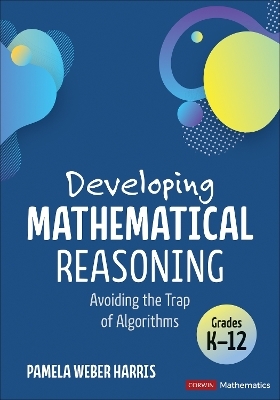
Developing Mathematical Reasoning
Corwin Press Inc (Verlag)
978-1-0719-4826-2 (ISBN)
- Noch nicht erschienen (ca. Mai 2025)
- Versandkostenfrei innerhalb Deutschlands
- Auch auf Rechnung
- Verfügbarkeit in der Filiale vor Ort prüfen
- Artikel merken
Author Pam Harris argues that teaching real math—math that is free of distortions–will reach more students more effectively and result in deeper understanding and longer retention. This book is about teaching undistorted math using the kinds of mental reasoning that mathematicians do.
Memorization tricks and algorithms meant to make math "easier" are full of traps that sacrifice long-term student growth for short-lived gains. Students and teachers alike have been led to believe that they’ve learned more and more math, but in reality their brains never get any stronger.
Using these tricks may make facts easier to memorize in isolation, but that very disconnect distorts the reality of math. The mountain of trivia piles up until students hit a breaking point. Humanity′s most powerful system of understanding, organizing, and making an impact on the world becomes a soul-draining exercise in confusion, chaos, and lost opportunities.
Developing Mathematical Reasoning: Avoiding the Trap of Algorithms emphasizes the importance of teaching students increasingly sophisticated mathematical reasoning and understanding underlying concepts rather than relying on a set rule for solving problems. This book illuminates a hierarchy of mathematical reasoning to help teachers guide students through various domains of math development, from basic counting and adding to more complex proportional and functional reasoning.
Everyone is capable of understanding and doing real math. This book:
Highlights the important mathematical relationships, strategies, and models for students to develop
Offers personal stories, reflection sections, and extensive practical exercises for easy implementation
Includes real math—a lot of it—to provide teachers with examples they can put to use in their classrooms immediately
This book is a valuable resource for educators looking to reach more students by building a strong foundation of mathematical thinking in their students. By addressing common misconceptions about math and providing practical strategies for teaching real math, this book shows that everyone can use the mathematical relationships they already know to reason about new relationships. In other words, everyone can math.
Pamela Weber Harris is changing the way we view and teach mathematics. Pam is the author of several books, including the Numeracy Problems Strings K-5 series, Building Powerful Numeracy, and the series Foundations for Strategies. As a mom, a former high school math teacher, a university lecturer, and an author, she believes everyone can do more math when it is based in reasoning rather than rote-memorizing or mimicking. Pam has created online Building Powerful Mathematics workshops and presents frequently at national and international conferences. Her particular interests include teaching real math, building powerful numeracy, sequencing rich tasks to construct mathematics, using technology appropriately, and facilitating smart assessment and vertical connectivity in curricula in schools PK-12. Pam helps leaders and teachers to make the shift that supports students to learn real math because math is figureoutable!
Preface
Chapter 1: Math Is Figure-Out-Able
Chapter 2: Developing Mathematical Reasoning
Chapter 3: The Trap of Addition and Subtraction Algorithms
Chapter 4: The Trap of Multiplication and Division Algorithms
Chapter 5: The Trap of Fraction- and Proportion-Solving Algorithms
Chapter 6: Lost in Functional Reasoning
Chapter 7: If Not Algorithms, Then What?
Conclusion
Discussion Questions
#MathStratChat – an example of Problem Talks and Problem Strings
References
Index
| Erscheint lt. Verlag | 14.5.2025 |
|---|---|
| Reihe/Serie | Corwin Mathematics Series |
| Verlagsort | Thousand Oaks |
| Sprache | englisch |
| Maße | 177 x 254 mm |
| Themenwelt | Schulbuch / Wörterbuch |
| Sozialwissenschaften ► Pädagogik ► Schulpädagogik / Grundschule | |
| Sozialwissenschaften ► Pädagogik ► Schulpädagogik / Sekundarstufe I+II | |
| ISBN-10 | 1-0719-4826-1 / 1071948261 |
| ISBN-13 | 978-1-0719-4826-2 / 9781071948262 |
| Zustand | Neuware |
| Informationen gemäß Produktsicherheitsverordnung (GPSR) | |
| Haben Sie eine Frage zum Produkt? |
aus dem Bereich


